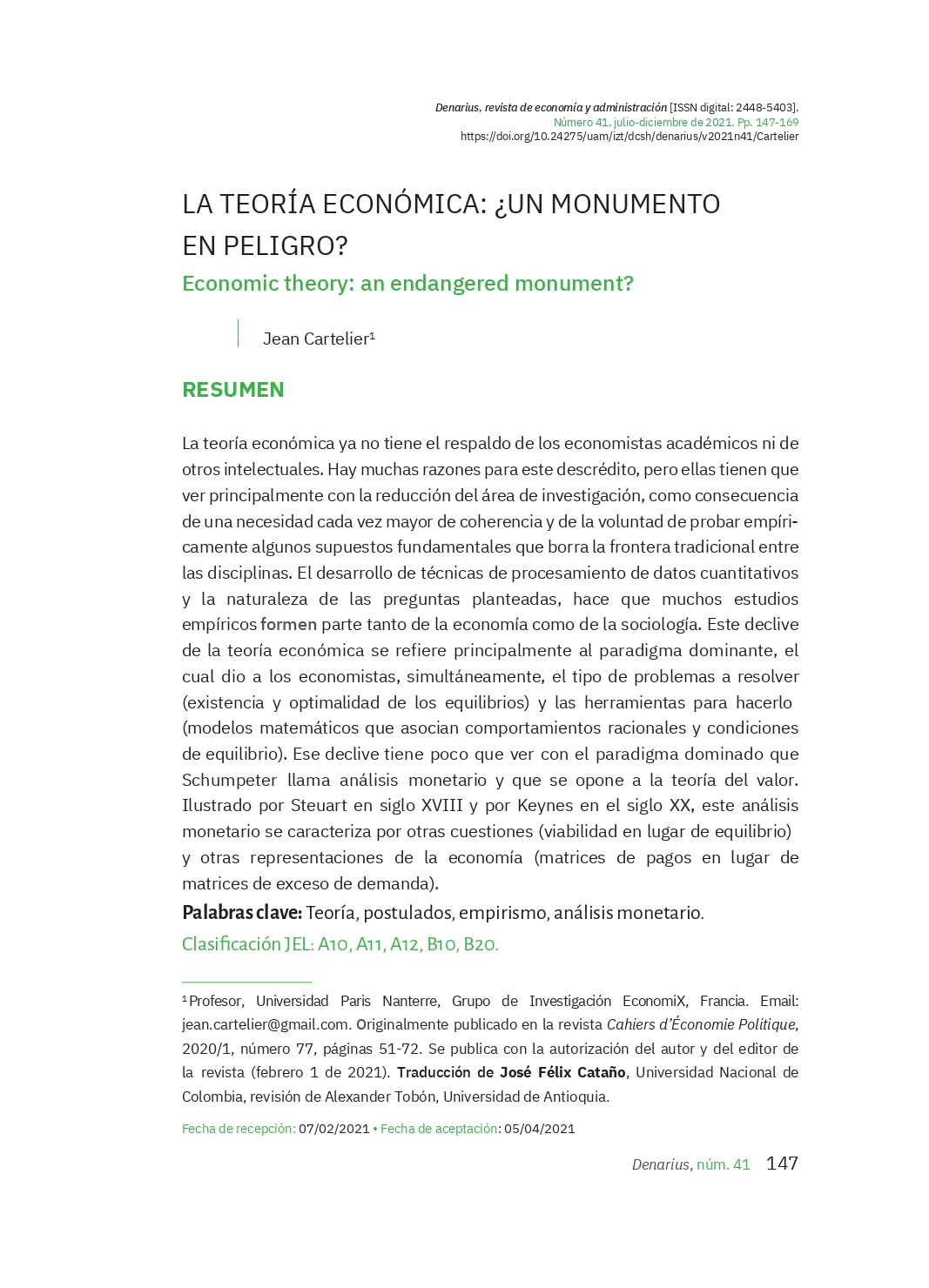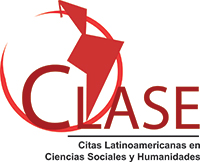Economic theory: an endangered monument?
Abstract
The economic theory has lost most of its attractiveness amongst academic economists. There are many reasons for this discredit, but they have to do mainly with the reduction of the research area, as a consequence of an increasing need for coherence and the will to empirically test some fundamental assumptions that blurs the traditional border between disciplines. The development of quantitative data processing techniques and the nature of the questions posed make many empirical studies part of both economics and sociology. This decline of economic theory refers mainly to the dominant paradigm, which simultaneously gave economists the type of problems to solve (existence and optimality of equilibria) and the tools to do so (mathematical models that associate rational behaviors and conditions balance). That decline has little to do with the dominated paradigm that Schumpeter calls monetary analysis and that runs counter to the theory of value. Illustrated by Steuart in the 18th century and by Keynes in the 20th century, this monetary analysis is characterized by other issues (viability rather than equilibrium) and other representations of the economy (payment matrices rather than excess demand matrices).
Downloads
References
Aubin, Jean-Pierre, Bayen, Alexandre & Saint-Pierre, Patrick (2011), Viability Theory, New Directions, Springer, Heidelberg.
Benetti, Carlo y Cartelier, Jean (1998), “La economía política como ciencia: la permanencia de una convicción mal compartida”, Lecturas de Economía, 48, 7-32.
Bolaños, Eduardo & Tobón, Alexander (2001), “Un mecanismo de precios para la teoría del valor”, Lecturas de Economía, 55, 31-68.
Cartelier, Jean (2016), L’intrus et l’absent, Essai sur le travail et le salariat dans la théorie économique, Presses de l’université Paris-Ouest.
Cartelier, Jean (2018), Money, Markets, Capital: The Case for a monetary analysis, Routledge, London.
Cataño, José Félix (2009), Lecciones de economía marxista: mercados, precios y dinero desde un enfoque heterodoxo, Facultad de Ciencias Económicas, Universidad Nacional de Colombia, Bogotá.
Debreu, Gérard, (1974), “Excess demand functions”, Journal of Mathematical Economics, vol. 1, p. 15-2
Gautié Jérôme (2007), “L’économie à ses frontières (sociologie, psychologie). Quelques pistes”, Revue économique, 2007/4 Vol. 58, p. 927-939.
Handbook of Rational Choice Social Research, (2013), edited by R. Wittek, T. Smijders and V. Nee, Stanford University Press.
Jany-Catrice, Florence & Orléan, André, (2018), « L’économie du xxie siècle », La Vie des idées : <https://laviedesidees.fr/L-Economie-du-XXIe-siecle.html>.
Kahneman D. (2003), “A Psychological Perspective on Economics”, American Economic Review, 93 (2), p. 162-168.
Kahneman D. & Tversky A. (1979), “Prospect Theory: An Analysis of Decisions under Risk”, Econometrica, 47 (2), p. 313-327.
Keynes, John Maynard [1936] (1973), The General Theory of Employment, Interest and Money, in The Collected Writings of John Maynard Keynes, vol. VII, MacMillan, St Martin Press.
Lagos, R. & Wright., R. (2005), “A unified framework for monetary theory and policy analysis”, Journal of Political Economy, 113, p. 463-484.
Luhmann, Niklas (1984), “Die Wirtschaft der Gesellschaft als autopoietisches System”, Zeitschrift für Soziologie, Jg 13, Heft 4, Oktober, p. 308-327.
Rouvroy, Antoinette & Berns, Thomas, (2013), « Gouvernementalité algorithmique et perspectives d’émancipation. Le disparate comme condition d’individuation par la relation?”, Réseaux, 177, p. 163-196.
Saari, D. and Simon, C. (1978), “Effective Price Mechanisms”, Econometrica, 53: 1117-31.
Schumpeter, Joseph A. (1954), History of Economic Analysis, edited from manuscript by Elisabeth Boody Schumpeter, New York, Oxford University Press.
Smith, Adam (1996), An Inquiry into the Nature and Causes of the Wealth of Nations, in The Glasgow Edition of the Works and Correspondence of Adam Smith, vol. 1 and 2, Clarendon Press, Oxford, [1776].
Shapley, L., S. & Shubik, M., (1977), “Trade using one commodity as a means of payment”, Journal of Political Economy, 85, p. 937-968.
Sonnenschein, Hugo, (1972), “Market excess demand functions”, Econometrica, vol. 40, p. 549-563.
Steuart, James (2015), An Inquiry into the Principles of Political Economy (2 vol.) [1767], Liguori Editore, Napoli.
Ulgen, Faruk (dir.), (2013), New Contributions to Monetary Analysis. The Foun dations of an alternative economic paradigm, Routledge, Abingdon Oxon, p. 259.
Wallace, Neil, (2001), “Whither monetary economics?”, International Economic Review, 42, 4, 847-869.














